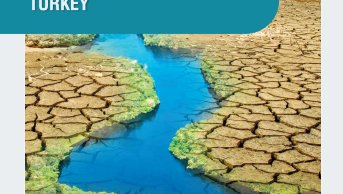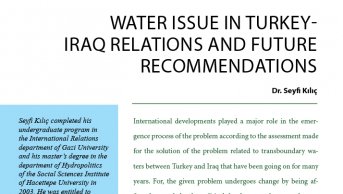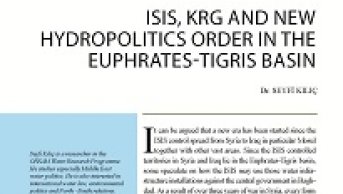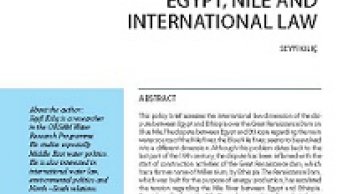The NGOs of Iraq as a Foreign Policy Tool: The Case of the Ilisu Dam
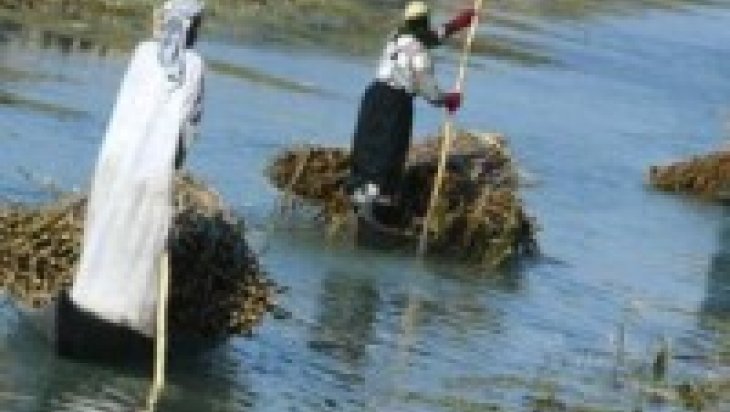
The problem between Iraq, Syria and Turkey related to the utilization of waters of the Euphrates-Tigris basin has been continuing since a long time. This problem has been frequently stated by Iraq in recent periods through different platforms.
In a statement which was made by the Ali Debbag, in 2011 when the relations between Iraq and Turkey deteriorated the approval of the High Level Strategic Cooperation Agreement bound to the condition that an agreement must be signed which set the amount of water releasing from the Euphrates-Tigris rivers. Additionally the aforementioned water agreement must be in the High Level Strategic Cooperation Agreement. Right along with this statement it is observed that when the relations strained between two states, Iraqi authorities made statements like this and accuses Turkey as the only responsible on the water problem in Iraq.
Iraq has also been spent effort to internationalize the transboundary water problem between Turkey, Syria and Iraq. Iraq has succeeded to evoke some countries which are the members of the Arab League regarding this issue since the 1960 when this problem emerged and it has begun to follow a similar policy in 2012. In Baghdad, the capital city, a conference entitled “The Application of International Law in the Protection of Water Rights in Common Waters with Non-Arab Countries” was held on May 31-June 1. In this conference, Iraq called the Arab countries which are not the party to the “1997 United Nations Convention on the Law Non-Navigational Uses of International Watercourses” to become a party of this convention. This indicates that the old policy have been raised again. Furthermore, Iraq has improved its relations regarding water with the United Nations and the European Union and, by doing so Iraq aims to get their support.
In addition to the policies mentioned above, Iraq also tries to use the nongovernmental organizations (NGOs) and their activities. The NGOs have mainly emerged in the Western world and they have been described in a wide range. The NGOs are defined as being outside the government organizations and they have gained power especially after the 1990s and begun to take part in official and legal documents. Gradual increase in the number of NGOs and their work areas is directly related to the idea that NGOs are areas where civil society has power. At some points, however, they are also seen as tools which can replace the state that the neo-liberal political philosophy wants to weaken. On the other hand, in addition to the government programs, NGOs are also seen among the first institutions to corporate in the formal programs of the financial institutions such as the World Bank. In this context, NGOs should not be seen as independent structures but rather they should be accepted as one of the pieces of a global mechanism. Thus, an approach which recognizes NGOs as taking into account both internal and external relations of the society would be more accurately thought pattern.
From the way of thinking regarding NGOs explained above, the Iraqi NGOs should be evaluated in the context of the new environment created after the American invasion of Iraq in 2003.
NGOs operating in Iraq do not have long history. These organizations have emerged mainly after the US-led coalition forces’ invasion of Iraq and the overthrow of Saddam regime. They are in a cover position of the democracy illusion of the new administration. It is a well known fact that these types of organizations are used as instruments of domestic and foreign policy by repressive regimes. In this context, it is not possible to argue that many NGOs operating in Iraq do not occupy a place outside the state’s structure.
Although the non-governmental organization (NGO) called the Iraqi Civil Society Solidarity Initiative (ICSSI), appears to be outside of this evaluation, it seems that regarding the transboundary water issue between Turkey and Iraq, ICSSI supports Iraq’s views. This organization embodies many NGOs and works on issues such as; freedom of speech, violation of human rights, problems regarding private security companies. ICSSI which works as a network organization also works a campaign called “Save the Tigris and Iraqi Marshes” (1). In the context of this campaign, the last act was to send an open letter to the Andritz, which is a Austrian based firm providing the turbines of the Ilisu Dam, on March 24th 2013. In the letter, it is mentioned that Turkey acted against the international law by building the Ilisu Dam, did not respect the people of downstream countries’ social, economical and cultural rights and that the Dam does not have the environmental impact assessment report. It is also demanded that the firm should put pressure on Turkish government in order to make a deal with the fair “sharing” of the waters with the other riparian countries. Especially since this final allegation is Iraq’s one of the most important demands, corresponding with Iraq’s transboundary water politics and hence holds a potential of strengthen Iraq’s hand on this matter. The evaluations regarding to the accuracy of those allegations are outside the scope of this analysis.
The mentioned network organization is active in the context of “Save the Tigris and Iraqi Marshes” campaign since March 2012. In the context of this campaign, there has been a workshop organised at University of Basrah. Moreover, an open letter of a four article has been sent to the Iraqi authorities including the president Talabani and Prime Minister Nuri el-Maliki. These demands are as follows: to start negotiations with Turkey in order to stop the construction of Ilisu Dam, to lay out a plan in order to take legal and economical actions regarding the firms working in construction, to apply UNESCO before June 2013 in order to get marshes recognized as world heritage and to share this with the Iraqi public and that Iraqi government to support “Save the Tigris and Iraqi Marshes” campaign.
The works of the Iraqi Civil Society Solidarity Initiative have a particular importance in terms of their effects on international community. It should be taken into consideration that these types of campaigns can be effective especially in recent years when the western companies are criticised by public opinion regarding the construction of large dams due to environmental concerns. On the other hand, this kind of civil society campaigns supporting the policies of Iraq regarding transboundary waters leads to a general perception towards “democratization” and, therefore, is more likely to get support from the Western public.
(1) http://www.iraqicivilsociety.org/campaigns/save-the-tigris-and-iraqi-marshes-campaign

